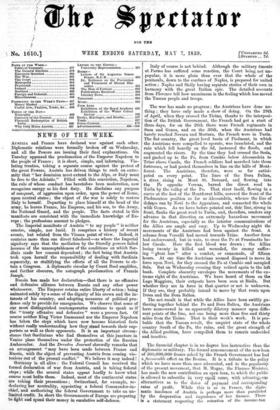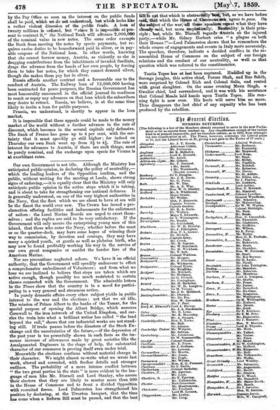NEWS OF THE WEEL The Imperial manifesto of Austria "
to my people " is neither concise, simple, nor lucid. It comprises a history of recent . events, but related from the Vienna point of view. Indeed, it contains more than one direct falsehood—as where the Imperial signitary says that the mediation by the friendly powers failed because of the unacceptableness of the conditions on which Sar- dinia made her consent dependent ; the fact being that Austria took upon herself the responsibility of dealing with Sardinia separately, so stultifying the efforts of all the Powers to ob- tain a Congress. A diplomatic circular by Count Buol amplifies, and further obscures, the autograph proclamation of Francis Joseph.
Russia has made her declaration—that there is no offensive and defensive alliance between Russia and any other power whatsoever. The Emperor retains entire liberty of action ; being animated solely by a sense of the dignity of his crown and the in- terests of his country, and adopting measures of political pru- dence only to provide for emergencies. We observe that some of our most distinguished contemporaries continue to speak as if the " treaty offensive and defensive " were a proven fact. Of course neither King Victor Emmanuel nor the Emperor Napoleon has taken the steps which have now become historical facts without really understanding how they stand towards their sup- porters as well as their opponents. It is an important circum-
stance that Sardinians who find, themselves at this juncture in Venice place themselves under the protection of the Russian Ambassador. And the Dresden Journal shrewdly remarks that an arrangement " may have been made between France and
Russia, with the object of preventing Austria from coming vic- torious out of the present conflict." We believe it may indeed ! Germany is all alive : the Federal Council has received the formal declaration of war from Austria, and is taking federal steps ; while the several states appear hardly to know what course most befits them. Indeed, most of the continental states are taking their precautions ; Switzerland, for example, re- declaring her neutrality, appointing a federal Commander-in- chief, and authorizing the federal . Government to take an un- limited credit. In short the Governments of Europe are preparing to fight and spend their money in emulative self-defence. Italy of course is not behind. Although the military emeute at Parma has suffered some reaction, the Court being not un- popular, it is more plain than ever that the whole of the peninsula, down to the confines of Naples, is prepared for united action ; Naples and Sicily having separate stories of their own in harmony with the great Italian epic. The detailed accounts from Florence tell how unanimous is the feeling which has moved the Tuscan people and troops.
The war has made no progress ; the Austrians have done no- thing ; they have only made a show of doing. On the 29th
of April, when they crossed the Ticino, thanks to the interposi- tion of the British Government, the French had got a start of three days, for on the 26th there were French regiments in Suss. and Genoa, and on the 30th, when the Austrians had barely reached Novara and Mortara, the French were in Turin. The flat country, the great level basin of Piedmont, in which the Austrians were compelled to operate, was inundated, and the rain which fell heavily on the 3d, increased the floods, and augmented the rivers. By the time they had crossed the Sesia, and wished up to the Po, from Cambio below Alessandria to Trino• above Casale, the French soldiers had marched into those fortresses, or had posted themselves in line on the hills of Mont- ferrat. The Austrians, therefore, were so far antici- pated on every point. The lines of the Dora Baltea, 'a river_ rising in Mont St. Bernard, and flowing into the Pro opposite Verrua, barred the direct road. to Turin by the valley of the Po. That river itself, flowing in a curve at the foot of the Montferrat hills, covered the front of the Piedmontese position as far as Alessandria, whence the lino of defence ran. by Novi to the Appenines, and connected the whole with Genoa. As we have before pointed out, this line, strong in front, flanks the great road to Turin, and, therefore, renders any advance in that direction an extremely hazardous movement for the Austrians, especially as the interior communications of the Allies are ample and easy. Up to Wednesday night the movements of the Austrians had been against the front. A column from Vercelli had moved towards Trine. Another force had endeavoured, but in vain, to cross the Po at Frassinetto be- low Casale. Here the first blood was drawn ; the , Allies losing twenty in killed and wounded, the enemy suffer- ing " ghat loss " after a combat, or cannonade, of fifteen hours. At one time the Austrians seemed disposed to move in force upon Novi, for they crossed the Po at Cambio and 000upied Sala. But on i'ednesday evening they retired again to the left bank. Complete obscurity envelopes the movements of the ex- treme right of the Austrians. We have heard. of them on the Lego Maggiore, their outposts have been seen at Biella. But whether they are in force in that quarter or not is unknown. If they are, they probably intend to move by that route upon Ivrea and the Dora Baltea.
The net result is that while the Allies have been swiftly ga- thering together behind the Po and Dora Baltea, the Austrians have manoeuvred in an apparently dilatory manner upon diffe- rent points of the line, not one being more than five and thirty miles from the Ticino. That is their week's work. It is pro- bable that the Tuscan revolt, the unquiet state of the whole country South of the Po, the rains, and the great strength of the Allied position, have compelled them to remain undecided and inactive.
The financial chapter is in no degree less instructive than the diplomatic or military. The formal announcement of the new loan of 500,000,000 francs asked by the French Government has had a favourable effect on the Bourse. It is a tribute to the policy which we have more than once advocated, and to the popularity of the present movement, that M. Magne, the Finance Minister, has made the new contribution an open loan, to which the public is allowed to subscribe in, yery suitt11 aims; with advant,...gely$ alternatives as to the dates of paymeiii and ottespentling rates of profit. While this is so in France, the diplo- matic insolence of Austria is perhaps more than paralleled by the desperation and impudence of her finance. There is a statement respecting the retention of the income-tax by the Pay Office as soon as the interest on the public funds shall be paid, which we do not understand, but which looks like a rather violent diversion of the public funds. A loan of twenty millions is ordered, but " since it is impossible at pre- sent to contract it," the National Bank will advance' ,000,000 of the nominal value in new notes. The same order exempts the Bank from meeting the notes by specie payments, but re- quires excise duties to be henceforward paid in silver, or in pay- able coupons of the National loan. In other words, knowing that she cannot borrow money, Austria, as violently as she is dragging contributions from the inhabitants of invaded Sardinia, drags the advance from the hands of her own people, by forcing them to take her notes, for which they cannot demand silver, though she makes them pay her in silver.
Russia affords another contrast and a favourable one to the conduct of Austria. The Railway loan of 12,000,000 having been contracted for peace purposes, the Russian Government has most honourably announced in the official journal its readiness to remit or repay any advances on that loan which the subscribers may desire to retract. Russia, we believe, is at the same time likely to invite a loan for public purposes.
Prussia, we understand, is shortly to appear in the loan market.
It is impossible that these appeals could be made to the money market of the world without a further advance in the rate of discount, which becomes in the several capitals only defensive. The Bank of France has gone up to 4 per cent, with the cer- tainty that it must speedily go still higher ; for indeed on Thursday our own Bank went up from 3/ to 41. The rate of interest for advances to Austria, if there are such things, must be purely nominal, and the exchange upon specie for Vienna is at exorbitant rates.



























